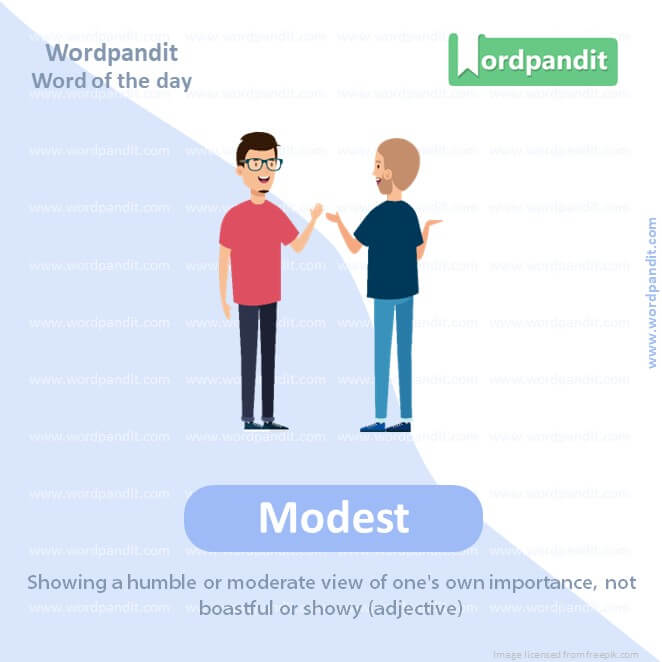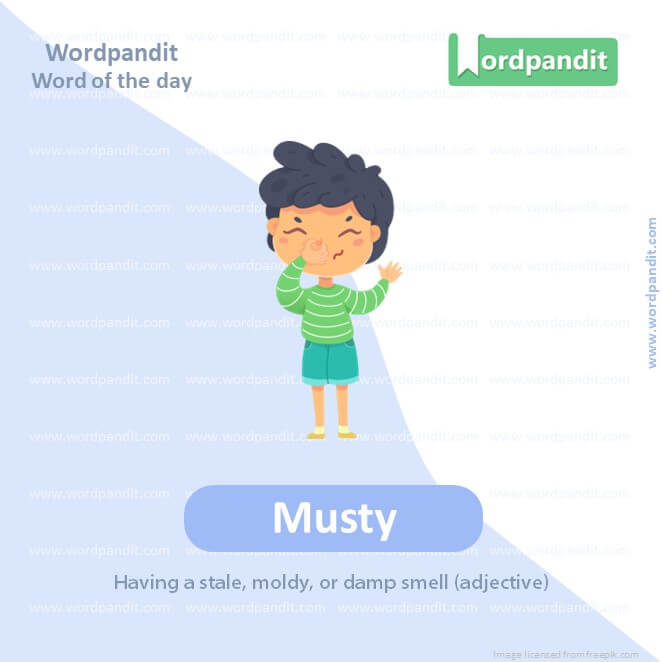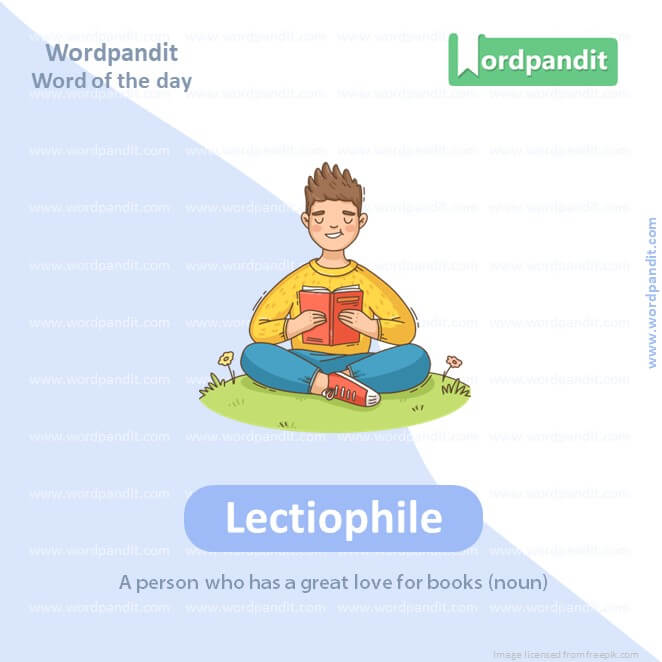Daily Vocabulary Words: List of Daily Used Words
Hi there. Welcome to this special section @ Wordpandit.
Our endeavour here is straightforward: highlighting important daily vocabulary words, you would encounter in The Hindu. This is your repository of commonly used words; essentially, we are posting a list of daily used words. Hence, this has significant practical application as it teaches you words that are commonly used in a leading publication such as The Hindu.
Visit the website daily to learn words from The Hindu.

WORD-1: Modest
CONTEXT: I have no idea exactly how many books we have here now. We collect as many as we can and they [readers] buy as many as they wish. It’s an ongoing process. It has been like this since we started in 1979, Sam, son and business partner of Charles Leakey, the founder of Leakey’s Bookshop, told me. Leakey’s is the largest second-hand bookshop in the U.K. I was talking to him in his modest office at the bookshop on Church Street, Inverness, Scotland. Talking to this young handsome man in his early thirties was as exhilarating as walking through the narrow passages between long lines of huge shelves stacked with old musty books and browsing them at liberty.
EXPLANATORY PARAGRAPH: Imagine if you had a really cool toy but didn’t brag about it to your friends. Being modest means not showing off or thinking you’re better than others, even if you have something special.
MEANING: Showing a humble or moderate view of one’s own importance, not boastful or showy (adjective).
PRONUNCIATION: MOD-est
SYNONYMS: Humble, Unassuming, Reserved, Low-key, Unpretentious, Self-effacing.
USAGE EXAMPLES:
1. She gave a modest smile when praised for her work.
2. They live in a modest house despite their wealth.
3. His modest nature made him well-liked by his peers.
4. She wore modest clothing to the event.

WORD-2: Exhilarating
CONTEXT: I have no idea exactly how many books we have here now. We collect as many as we can and they [readers] buy as many as they wish. It’s an ongoing process. It has been like this since we started in 1979, Sam, son and business partner of Charles Leakey, the founder of Leakey’s Bookshop, told me. Leakey’s is the largest second-hand bookshop in the U.K. I was talking to him in his modest office at the bookshop on Church Street, Inverness, Scotland. Talking to this young handsome man in his early thirties was as exhilarating as walking through the narrow passages between long lines of huge shelves stacked with old musty books and browsing them at liberty.
EXPLANATORY PARAGRAPH: Think about how you feel when you’re super happy and excited, like when you’re going really fast on a bike. Exhilarating means something that makes you feel really happy and excited!
MEANING: Making one feel very happy, animated, or elated; thrilling (adjective).
PRONUNCIATION: eg-ZIL-uh-ray-ting
SYNONYMS: Exciting, Thrilling, Stimulating, Invigorating, Electrifying, Energizing.
USAGE EXAMPLES:
1. Riding the roller coaster was an exhilarating experience.
2. The view from the mountain top was exhilarating.
3. She found the competition to be exhilarating.
4. The exhilarating news made them jump for joy.

WORD-3: Musty
CONTEXT: I have no idea exactly how many books we have here now. We collect as many as we can and they [readers] buy as many as they wish. It’s an ongoing process. It has been like this since we started in 1979, Sam, son and business partner of Charles Leakey, the founder of Leakey’s Bookshop, told me. Leakey’s is the largest second-hand bookshop in the U.K. I was talking to him in his modest office at the bookshop on Church Street, Inverness, Scotland. Talking to this young handsome man in his early thirties was as exhilarating as walking through the narrow passages between long lines of huge shelves stacked with old musty books and browsing them at liberty.
EXPLANATORY PARAGRAPH: Imagine opening an old book or walking into a room that hasn’t been used for a long time. It has a special old and dusty smell. That smell is what we call musty.
MEANING: Having a stale, moldy, or damp smell (adjective).
PRONUNCIATION: MUS-tee
SYNONYMS: Stale, Moldy, Damp, Fusty, Mildewy, Airless.
USAGE EXAMPLES:
1. The attic had a musty smell.
2. Her clothes felt musty after being in the basement.
3. He opened the musty old book.
4. The room was dark and musty.

WORD-4: Hectic
CONTEXT: I came to Inverness and to Leakey’s from Tomatin after a hectic tour of the Highlands and a good night’s sleep over there. I was all fresh, enthusiastic and curious as any lectiophile would naturally be. I had done, as usual, some home work on the Scottish culture and literature, libraries and bookshops in Inverness, Edinburgh and Glasgow before I embarked on this biblio tour for 20 weeks.
EXPLANATORY PARAGRAPH: Think about a day when you’re running around doing a lot of things, like going to school, playing games, and then doing homework. Hectic means very busy and full of activity.
MEANING: Full of busy activity; very busy and fast-paced (adjective).
PRONUNCIATION: HEK-tik
SYNONYMS: Frantic, Frenzied, Busy, Chaotic, Bustling, Feverish.
USAGE EXAMPLES:
1. It was a hectic day at work.
2. The city streets were hectic during rush hour.
3. She led a hectic lifestyle.
4. The kitchen was hectic during the dinner rush.

WORD-5: Lectiophile
CONTEXT: I came to Inverness and to Leakey’s from Tomatin after a hectic tour of the Highlands and a good night’s sleep over there. I was all fresh, enthusiastic and curious as any lectiophile would naturally be. I had done, as usual, some home work on the Scottish culture and literature, libraries and bookshops in Inverness, Edinburgh and Glasgow before I embarked on this biblio tour for 20 weeks.
EXPLANATORY PARAGRAPH: Think of someone who loves books a lot. They enjoy reading and collecting books. A lectiophile is a person who loves books that much.
MEANING: A person who has a great love for books (noun).
PRONUNCIATION: lek-TEE-o-file
SYNONYMS: Book lover, Bibliophile, Reader, Book enthusiast, Literary enthusiast, Bookworm.
USAGE EXAMPLES:
1. As a lectiophile, her room was filled with shelves of books.
2. He identified himself as a lectiophile at the book club.
3. Her gift to the lectiophile was a rare edition of a classic novel.
4. The lectiophile spent hours in the library.
WORD-6: Enormous
CONTEXT: I entered Leakey’s, the wonderful world of used books, shortly after it was opened in the morning. There were some 20 or so people in the different parts of the shop — some browsing and some just wondering at the enormous collection of musty used books. For me, it was more than excitement. I was in a trance. I paced up and down the shop, smelling, touching, caressing, cajoling and at times, even kissing the books.
EXPLANATORY PARAGRAPH: Think about something really, really big, like a giant elephant or a huge mountain. Enormous means something is very large or huge.
MEANING: Very large in size, quantity, or extent (adjective).
PRONUNCIATION: e-NOR-mus
SYNONYMS: Huge, Immense, Gigantic, Massive, Vast, Colossal.
USAGE EXAMPLES:
1. The tree in their yard was enormous.
2. They faced an enormous challenge.
3. The stadium was of enormous size.
4. She felt an enormous sense of relief.
WORD-7: Trance
CONTEXT: I entered Leakey’s, the wonderful world of used books, shortly after it was opened in the morning. There were some 20 or so people in the different parts of the shop — some browsing and some just wondering at the enormous collection of musty used books. For me, it was more than excitement. I was in a trance. I paced up and down the shop, smelling, touching, caressing, cajoling and at times, even kissing the books.
EXPLANATORY PARAGRAPH: Imagine being so focused on something like watching TV or daydreaming that you don’t notice anything else. A trance is like that. It’s when someone is not completely awake and aware of what’s going on around them.
MEANING: A half-conscious state, seemingly between sleeping and waking, where someone is not fully aware of their surroundings (noun).
PRONUNCIATION: TRANS
SYNONYMS: Daze, Stupor, Reverie, Hypnosis, Daydream, Semi-consciousness.
USAGE EXAMPLES:
1. He was in a trance while listening to music.
2. The hypnotist put her into a trance.
3. Lost in thought, he wandered the streets in a trance.
4. The repetitive music put her in a trance.
WORD-8: Caressing
CONTEXT: I entered Leakey’s, the wonderful world of used books, shortly after it was opened in the morning. There were some 20 or so people in the different parts of the shop — some browsing and some just wondering at the enormous collection of musty used books. For me, it was more than excitement. I was in a trance. I paced up and down the shop, smelling, touching, caressing, cajoling and at times, even kissing the books.
EXPLANATORY PARAGRAPH: Think about gently stroking a kitten or softly touching a flower. Caressing means touching something in a gentle and loving way.
MEANING: Touching or stroking gently or lovingly (verb).
PRONUNCIATION: kuh-RESS-ing
SYNONYMS: Stroking, Fondling, Petting, Gently touching, Nuzzling, Cuddling.
USAGE EXAMPLES:
1. She was caressing the baby’s cheek softly.
2. His hand caressing her hair was soothing.
3. The breeze caressing her face felt refreshing.
4. He was caressing the cat as it purred.
WORD-9: Cajoling
CONTEXT: While India has made significant progress in addressing these imbalances and managing the diversity, any honest appraisal would have to account for the unfinished tasks at hand. Regional identities and imbalances are not to be brushed under the carpet or forced into silence, unless the attempt is to create an authoritarian country.
EXPLANATORY PARAGRAPH: Imagine trying to get your friend to play a game with you by being really nice and sweet. Cajoling is like that. It means to persuade someone to do something by being really nice or flattering.
MEANING: Persuading someone to do something by sustained coaxing or flattery (verb).
PRONUNCIATION: kuh-JOHL-ing
SYNONYMS: Coaxing, Persuading, Wheedling, Sweet-talking, Flattering, Convincing.
USAGE EXAMPLES:
1. He was cajoling her to go on a date with him.
2. She used cajoling words to convince her parents.
3. His cajoling tone made them agree to his plan.
4. They were cajoling the crowd into cheering.
WORD-10: Avid
CONTEXT: I particularly liked the sweet smell that belongs to the old books. The books intoxicate an avid reader anywhere in the world.
EXPLANATORY PARAGRAPH: Think about something you really, really like doing, like playing a game or drawing. Avid means being very enthusiastic and passionate about something you love a lot.
MEANING: Having or showing a keen interest in or enthusiasm for something (adjective).
PRONUNCIATION: AV-id
SYNONYMS: Keen, Enthusiastic, Eager, Passionate, Devoted, Ardent.
USAGE EXAMPLES:
1. She is an avid reader of mystery novels.
2. He’s an avid fan of soccer.
3. Her avid interest in art was evident.
4. They were avid collectors of rare stamps.
Vocabulary Difficult Words
In our journey of language learning, an encounter with ‘vocabulary difficult words’ is inevitable. These seemingly intimidating terms can often seem like stumbling blocks. However, they also offer a unique chance to deepen our understanding and competence in the language. With a strategic approach, learning ‘vocabulary difficult words’ can become less daunting and more of an empowering undertaking.
To befriend ‘vocabulary difficult words’, comprehension is key. Familiarize yourself with the meaning, usage, and context of these words. Utilize different resources such as books, documentaries, online articles, and digital content. This contextual exposure can ease the process of understanding ‘vocabulary difficult words’.
Challenging as they may seem, ‘vocabulary difficult words’ can be tamed with appropriate memory tactics. Use of flashcards or digital language learning apps that support active recall and spaced repetition can be effective. To foster deeper connections with ‘vocabulary difficult words’, employ mnemonic techniques. This cognitive strategy, involving association of new information to known concepts or stories, aids in better retention and recall.
Another essential in mastering ‘vocabulary difficult words’ is practice. Be it in conversations, written communications, or social media interactions, endeavor to incorporate these words. Practice not only reinforces your knowledge but also enhances your confidence in using these words.
In conclusion, navigating the terrain of ‘vocabulary difficult words’ involves a confluence of comprehension, memory tactics, and active practice. These strategies, interwoven, help transform intimidating words into familiar friends. By conquering ‘vocabulary difficult words’, you not only augment your vocabulary but also elevate your language skills. Remember, every challenging word unlocked is yet another ornament in your linguistic archive. So, delve deep into the ‘vocabulary difficult words’, and uncover the treasures they hold.










